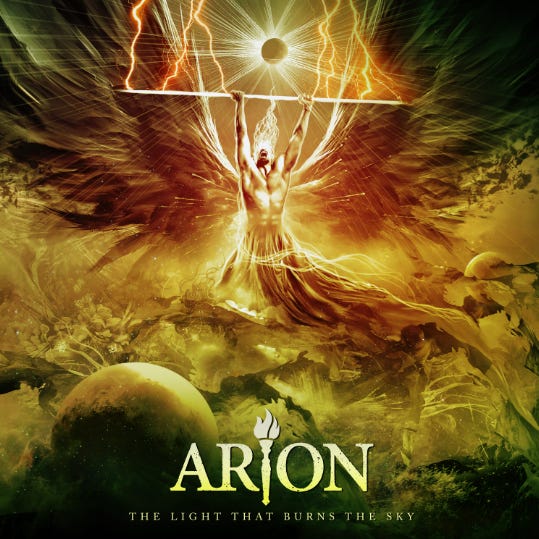Arion are a band I’ve been following for a while. They were an incredibly promising young Symphonic Power act in the mid-aughts who, since their third album, have sort of lost traction.
That sense of promise and potential originated with the band’s participation in the Finnish National Eurovision Finals in 2013 with their song “Lost”, where they placed fifth (of eight). It wasn’t a winning performance, but it was good enough to earn the young band some solid acclaim and momentum. They released their debut album, Last of Us, the following year. The band would garner excitement again in 2016 with their song “At the Break of Dawn”, featuring Elize Ryd of Amaranthe, and the album that song featured on, Life is Not Beautiful, released in 2018.
Those two albums, especially the debut, have been favorites of mine for years. There’s a lot to love about them. So when 2021’s Vultures Die Alone wasn’t even remotely similar, I reacted pretty negatively; frankly, I may have underrated it. The thing I didn’t realize at the time was that the band had changed vocalists way back in 2015.1 The original vocalist, Viljami Holopainen, was a silky tenor who excelled at carrying the band’s Symphonic side; the new vocalist, Lassi Vääränen (also of Constantine), has a lower, more gravelly voice. Vääränen’s efforts on slower, more melodic songs, are noticeably lacking compared to his predecessor,2 but seems better-suited for heavier, faster songs.
So Vultures Die Alone was the band adapting to that approach (and the numbers on that album’s Spotify plays concur — the slower songs have far fewer plays). The Light That Burns the Sky pushes even further into this evolution. There are no slow songs — the band has just opted to avoid them altogether. And the Symphonic elements are all but gone. They’re still present, but are so thoroughly buried by the mix that they may as well be entirely absent in most songs. So this is not a true Symphonic Power album. It’s closer to Power and Speed with Symphonic elements which occasionally break through to say hello.
That’s neither good nor bad, in itself — just an observation. What isn’t great is that the tracklist is a bit hit-and-miss. Some of the songs work really well. I enjoy the opening pair of songs: title track “The Light That Burns the Sky” and “Like the Phoenix I Will Rise”; I also think the album’s closing trio are among its strongest (and most melodic) efforts:
“Black Swan” is a great example of how that hard, heavy energy that Arion is trying to channel can also be melodic, especially in the chorus where some of the symphonic elements break through;
“In the Heart of the Sea” kicks off with strong Nightwish vibes, with the utilization of symphonic elements taking the lead over a heavier guitar/bass/drum foundation, and the motif repeats throughout, with strings also breaking through outside of that motif regularly;
and the album’s finale, “Into the Hands of Fate”, kicks off with a gentle intro of choir, strings, keys, and light percussion leading into an assault of heavy guitar riffs, but, most importantly, the band finds one of those big swells that they haven’t utilized much recently in the chorus.
It’s a strong finish to an otherwise average album.
Because most of the songs just don’t do anything to truly set themselves apart. Arion is starting to feel out its new identity, but still doesn’t know how to reliably write bangers in this mode.
This is one of those albums that feels like it comes really close, on every track, to having something great going on, but misses it almost every time. Some of the tracks in the middle are good, but most are just okay or forgettable — because, again, they don’t do anything to set themselves apart. The Metal world is chock full of great acts; a lot of mouths vying for a disproportionately small piece of the overall musical pie.
The best songs here are the ones where the mix doesn’t entirely bury the band’s symphonic elements and lean on their melodic ability. It’s good, and I would encourage anybody who’s looking for something heavier, but still without harsh vocals, to give it a try.
Rating: Green
I know. I know. It should have been obvious. But I had already internalized both of those albums before I started looking at albums critically.
This fact doesn’t diminish my love for “Through Your Falling Tears” — Vääränen truly did a great job on that one.





